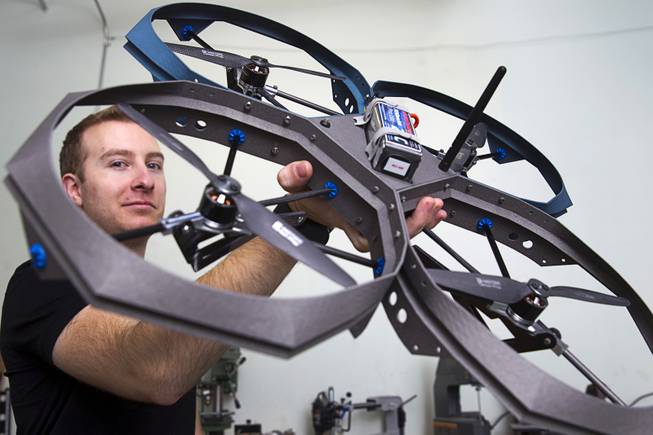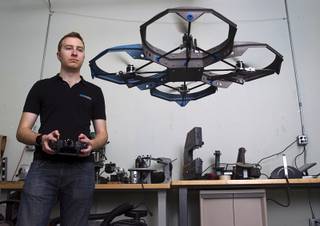
Greg Friesmuth, CEO/founder, displays the Qua.R.K. (Quad Rotor Research Kit) drone at SkyWorks, a company producing research drones, in Henderson Monday, Jan. 26, 2015.
Thursday, Feb. 12, 2015 | 2 a.m.
A year ago, Greg Friesmuth spent most of his time in the Cage, a cramped room in UNLV’s science and engineering building where he tested homemade drones for a company he had just founded called Skyworks.
Now he’s a graduate and spends most days in the Pit, a windowless room full of workbenches and computers inside Skyworks’ new office in Henderson, where the startup took up a lease this summer.
A lot has changed.
Today, the 25-year-old has investors to persuade, six full-time employees to manage and customers — mostly universities — to satisfy. Skyworks also has its first product: the Qua.R.K., a sophisticated quadrotor drone.
So far they’ve produced 10 of the drones. UNLV bought four to use in classes they’re introducing as part of a minor announced last fall on unmanned aerial systems.
“We’ve actually gone from an idea to a business,” Friesmuth said.
The Pit is where Qua.R.K.s are assembled after their frames arrive from a 3D printer offsite. Loose wires and circuits are piled among power tools and the occasional toy drone lying around to teach new employees how to fly.
“This is where we engineer stuff and sometimes put drones together,” Friesmuth joked.
Walk through the Pit and there’s a good chance you’ll step on a Lego. Most of Friesmuth’s employees are either current UNLV students or recent graduates, like COO Jinger Zeng, a mechanical engineer who helped a team at UNLV design an efficient home that nearly won a Department of Energy “solar decathlon” competition.
Before producing the Qua.R.K., SkyWorks won several business competitions, including $80,000 from the Southern Nevada Business Plan competition.
Skyworks’ primary focus is indoor drones, in part because the Federal Aviation Administration’s strict regulations on outdoor use can make it risky for investment firms to pour money into a company that could be regulated out of business. Focusing indoors also makes Skyworks stand out among its peers.
“The thrill of being part of something new is really exciting,” said Rakitha Perera, an electrical engineering major at UNLV who works as the company’s full-time media director. “You start learning, then refining and you keep going.”
Though it’s entirely run by twenty-somethings — and one 18-year-old — their approach to business is meticulous.
While other companies are busy churning out cheap drones to keep the world’s hobbyists stocked for the next decade, Skyworks is sitting back, tweaking code and streamlining.
“A camera is an easy thing to throw in a drone,” Friesmuth said. “If you want a drone that does anything else, that solution doesn’t exist.”
There is a lot of money to be made in developing technology that can accomplish what Friesmuth calls the “dirty, dangerous and dull.” For instance: Why risk sending a human to survey an unstable mineshaft when a drone equipped with a collage of high-tech sensors could do it?
The Qua.R.K., which costs $9,000, has four rotors and a square foundation containing the flight software. Skyworks designed the Qua.R.K. to be easily customized by attaching different modules and sensors. Even the software can be tweaked.
Attach a laser-scanning module to the drone to construct a 3D map of a certain area, for example, or a radiation sensor that could measure the level of damage in a nuclear reactor after a disaster like Fukushima.
When you buy a Qua.R.K., Friesmuth says, you’re buying a toolbox. That means Skyworks can serve a wide variety of clients who can adapt the drone to serve their specific needs.
“It’s a new approach to quadrotors,” he said. “There haven’t really been any other drones out there that have this modular concept.”
Right now, Skyworks is courting more investors and working to get the Qua.R.K. classified as an experimental aircraft, which would exempt it from some federal restrictions.
Around $200,000 has been invested into the company so far, mostly from private individuals called angel investors. Skyworks is hoping to raise around $1 million.
Now that they have sold their first drones, the next step is using information gathered from customers to strengthen the company’s business model. After that, Friesmuth said the company could be ready for serious venture capital investment.
“Right now there’s a lot of money going into other companies, so we need similar financials to compete,” Friesmuth said. “Drones are going to be as big as phones and computers.”


Join the Discussion:
Check this out for a full explanation of our conversion to the LiveFyre commenting system and instructions on how to sign up for an account.
Full comments policy